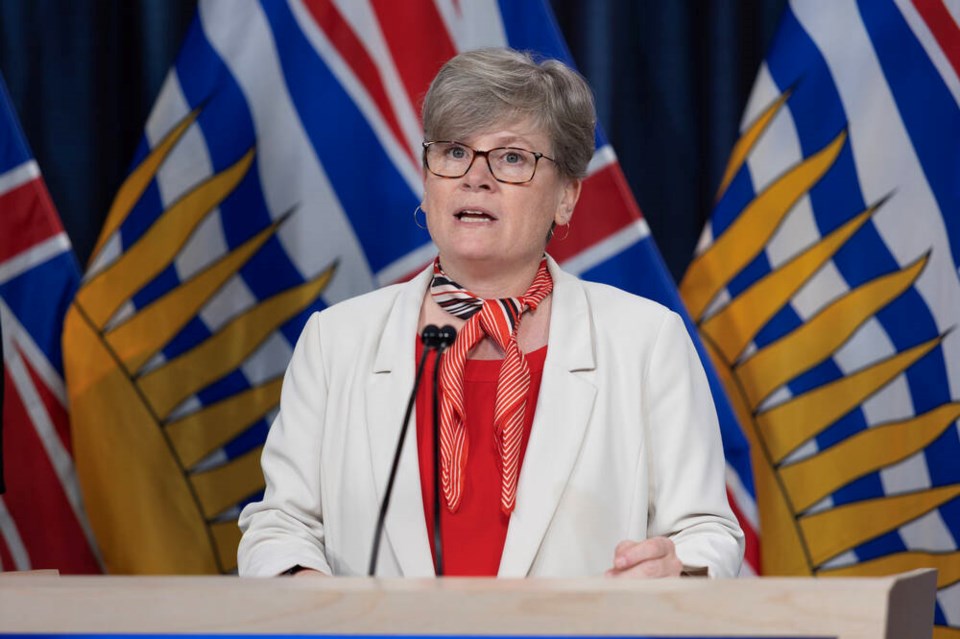B.C. will retain life-saving overdose-prevention sites even if the Conservatives — who have pledged to try to curtail or shut them down — win the federal election, says Health Minister Josie Osborne.
There are 39 overdose-prevention sites and four supervised-consumption sites in the province, including eight overdose-prevention sites on Vancouver Island.
Osborne said it’s important for the province to have a “suite of tools” that includes the sites — along with distribution of the overdose-reversing drug naloxone and drug-testing sites — as part of its response to the toxic-drug-overdose crisis, which was declared a public-health emergency in April 2016.
“These are services that save lives and they connect people to the supports and the people they need to talk to to access those supports,” Osborne told media on Tuesday.
Conservative Leader Pierre Poilievre, who called overdose-prevention sites “drug dens” during a campaign stop in New Westminster on Sunday, suggested his party would eliminate most of the sites if elected, preserving only those that lead immediately to recovery options.
A party background sheet said a Poilievre government would “shut down dangerous drug dens” by amending a section of the Controlled Drugs and Substances Act to prevent provinces from “unilaterally authorizing overdose prevention sites that currently operate with little to no federal oversight.”
Municipalities are required to seek exemptions from Health Canada under the act to operate supervised-consumption sites like Insite in Vancouver’s Downtown Eastside.
The existing exemptions are due to expire on Sept. 30.
However, overdose-prevention sites in B.C. — which can be fixed, mobile or episodic and run by either non-profits or health authorities — operate under provincial ministerial orders.
The province can establish a site wherever there is a need under the Public Health Act and the terms of the response to the toxic-drug public health emergency, said Osborne.
Even if a new federal government wanted to remove the federal exemption, “that’s not going to change the path that British Columbians are on in terms of providing these sites, in terms of investing in treatment and recovery, and in continuing to do everything we can to support people in their journey — it’s a toxic-drug-overdose crisis,” Osborne said.
Not everybody is ready to step into treatment and recovery right away but the province wants to make sure they stay alive until they are ready, she said, “so that’s why overdose-prevention sites are one important tool.”
Aside from monitoring drug use and providing access to life-saving services, overdose-prevention sites connect users with supports and services, Osborne said.
The health minister said the province is working toward “minimum services standards” at the sites to ensure the safety of both users and staff.
Over the last five years, the sites have prevented more than 10,000 deaths, said Osborne.
In his campaign stop in B.C., Poilievre called drug-consumption sites “a total disaster here in British Columbia and around the world,” suggesting research shows “that they do not save lives or protect the community.”
Asked in Saanichton on Monday about the Conservative leader’s remarks, Liberal Leader Mark Carney said the effectiveness of the sites is “undergoing a review” with a view to the best mechanism or approach going forward — in addition to stopping drugs coming into Canada and working with provinces on providing treatment and recovery services.
Addiction medicine physician Dr. Jill Wiwcharuk said Tuesday that she finds it “extremely frustrating” to have treatment options directed by politicians.
“Do politicians debate the benefits and risks of the latest intervention being offered for cardiovascular disease?”
Wiwcharuk attributed the interference to the stigma associated with addiction, which is “too often seen as a moral failure instead of the crippling disease that it actually is.”
“I don’t pretend to be a politician. I would appreciate it if politicians don’t pretend to be medical experts,” she said, adding there are mountains of studies showing supervised consumption sites save lives and ultimately lead to safer communities.
Wiwcharuk said she’d have “nothing to fear” from a review of the benefits of such sites, because if the work is done in good faith, “then my patients will not be at risk of losing these life-saving interventions.”
One of the key parts to all supervised-consumption sites is that they are a stepping stone to community referrals, including primary care, housing, case management and treatment, she said.
“They are about much more than just supervised consumption of drugs,” she said. “And they are a key component to recovery for many people.”
>>> To comment on this article, write a letter to the editor: [email protected]



